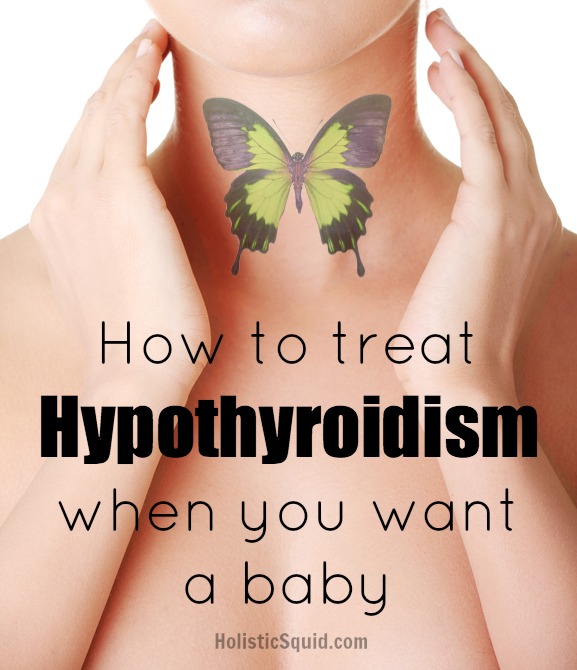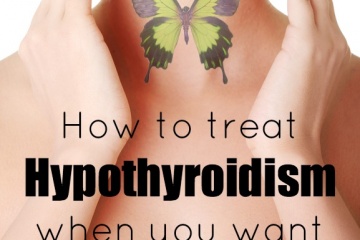
[This guest post about hypothyroidism and infertility was written by Laura Erlich, co-author of our book, Feed Your Fertility. Laura practices Chinese medicine in Los Angeles and is board certified in reproductive medicine. You can read more at her blog Mothernurturela.com.]
The thyroid is a small, butterfly shaped gland that sits in your throat, governing the way every cell in your body metabolizes energy. That’s right, this tiny little waif of a body part is the official-in-charge of all the things that make you go.
Without the hormones made by your thyroid, your body would come to a screeching halt. Is it any wonder why it’s called the ‘Master Gland'?
Unfortunately, for as powerful and almighty as the thyroid is, she’s also a bit of a shrinking violet. Our thyroids are fragile, and easily upset by all kinds of things, from radiation, stress, crash diets, sleep deprivation and food sensitivity to hormone disruptors like plastic. An out-of-whack thyroid can wreak havoc on our bodies, from very minor health issues to a major health crisis, including infertility.
The thyroid goes awry in one of two ways, it either gets too fast (hyperthyroid) or too slow (hypothyroid). Certain autoimmune conditions (like Graves and Hashimoto's) can also affect the thyroid.
In this post, we’re going to take a look at how the thyroid affects fertility when it gets too slow – and what you can do about it in a timely fashion.
What is hypothyroidism?
Hypothyroidism is a condition where an underactive thyroid fails to produce enough hormones, and various body systems slow down. Common symptoms can include fatigue, feeling cold, weight gain, sluggishness, depression, constipation, thinning hair, dry skin and irregular menstruation.
In terms of fertility, hypothyroidism can also contribute to implantation problems, miscarriage and decreased fetal IQ, if left unchecked during pregnancy. (source)
How hypothyroidism affects baby-making
Imbalances in the thyroid can have a direct effect on both becoming and staying pregnant. If you have thyroid issues (or suspect you do), it’s best to have blood work done before trying to conceive, and to be monitored throughout your pregnancy.
Most people with an under-active thyroid will have some of the symptoms listed above. A true diagnosis comes from blood tests that measure your thyroid hormones.
It’s super important to note that the “upper limit” of “normal” TSH levels (5) is too high for baby making. Most fertility docs will treat women until their thyroid levels are below 2.5. If you’re doctor thinks you’re nuts for asking about this, get a second opinion, especially if you’ve had trouble conceiving or staying pregnant.
Some ways that low thyroid hormones can impact fertility:
Elevated Prolactin can prevent ovulation, and are associated with a hypo-thyroid.
Low Progesterone: a dip in thyroid levels has a direct impact on your ovaries and can lead to low progesterone levels, which in turn can contribute to conditions like:
- Anovulation (when you don’t release an egg)
- PCOS – a condition that affects the ability to conceive
- Luteal Phase defect– a shortened ‘2nd half' of the menstrual cycle
- Increased miscarriage rise
How to treat hypothyroidism and infertility
The natural vs. synthetic debate
There are lots of ways to go about correcting a slow thyroid, both natural and conventional. The first thing you have to think about when it comes to your fertility, however, is time. The process of bringing your thyroid up to speed naturally can be lengthy, and involves a bunch of lifestyle changes. While getting your thyroid working properly on its own should be your ideal goal, it’s not always possible when you’re racing the baby clock.
Synthetic thyroid hormone has been around a long time, and there are minimal side effects associated with short-term use. Keep in mind that your thyroid will likely need an extra boost once you are pregnant, so be sure to be monitored throughout.
Holistic ways to support thyroid health
While time may be of the essence, making supplementation with thyroid meds advisable, there are still plenty of things you can do to minimize the amount of medication you need by supporting your thyroid's function naturally. Here are a few ideas to get you started.
#1 – Reduce Your Stress
While stress is an unavoidable part of life, prolonged periods of extreme stress can wreak havoc on your thyroid. If you are under a great deal of stress and trying to get pregnant, take a look at your life and see where you might be able to make some changes.
#2 – Eat Real Food
Refined and processed foods cause stress in our bodies, and ultimately lead to disease. Focus on a real food lifestyle and try to eliminate packaged and processed foods, sodas and other chemicals from your diet and beauty regiment. Don't know where to start? Read this post.
#3 – Consider supplementation
While I generally believe that health can be achieved through proper nutrition alone, this is not always the case with a thyroid condition. Certain key supplements can help a sluggish thyroid perk up. Here are some common ones:
- Iodine – Iodine is a mineral, and is vital for thyroid health and hormone production. Iodine can be found in certain foods, especially sea vegetables and fish, and can also be taken in both a pill and liquid form. If you have an autoimmune thyroid condition, check with your doctor before taking iodine.
- Selenium – Selenium is another mineral vital to thyroid health.
- Antioxidants – These powerhouse nutrients clean up the mess made by free radicals (namely, inflammation). While it is very important to focus on getting antioxidants from food, people with serious thyroid issues and auto-immune conditions might want to supplement with them as well.
- Vitamin D – Vitamin D provides critical nutrition that allows our immune system to function properly. Here in the west, we have an epidemic of Vitamin D deficiency. It’s a great idea to have your levels checked the next time you have a blood test, and supplement accordingly.
- Bio-identical thyroid medications – Just like they sound, these meds are natural versions of thyroid hormones, and are viewed by the body as a virtually “identical” replacement for the stuff your own thyroid makes.
#4 – Make smart lifestyle choices
- Sleep – Our bodies simply cannot do the work of healing without adequate rest. This fact is especially true for thyroid health.
- Exercise – Keeping your body moving plays a huge role in how well your thyroid functions.
- Acupuncture does wonders for reducing stress, supporting the thyroid and promoting fertility.
 How your lifestyle may be inhibiting your ability to conceive – and what to do about it
How your lifestyle may be inhibiting your ability to conceive – and what to do about it







Very nice post. I would caution that a TSH test is a pituitary hormone test, not a thyroid test so it isn’t often very accurate. It may have a correlation with your thyroid levels, but it may not. If you’ve ever had a head injury, for example, it may be a useless test. It is better to test the Free T3 and Free T4 to find out your actual thyroid levels. I have almost no thyroid function, I’ve never had a head injury, yet my TSH has never been higher than 1.5 except for a brief period I took Synthroid and it shot sky high. I spent quite a bit of time nearly comatose before I finally found a doctor who knew to test my thyroid hormones instead of my pituitary.
Excellent post! I have struggled with infertility for 4 years without ever achieving pregnancy. I was diagnosed with Hypothyroidism in 2007. Although my hypothyroidism is controlled and stable, I have still struggled. Thanks to this article, I have intentions on reaching out more “holistically” to get the the root of my problem! (Healthy women in 20’s with no conditions relating to infertility). I plan on making dietary changes, as well as seeking out acupuncture. Thanks for the info!
It is my understanding that the reason many women have hypothyroidism is often due to hormonal imbalance, which is likely what caused the other symptoms listed like LPD. Thoughts on using vitex to treat? I know many people have had success with it (though most of them are PCOS people). It is supposed to help raise progesterone (which definitely should help with LPD since progesterone dropping too low too soon means bleeding too soon to allow implantation).
The real question I was working towards was: do you think vitex could in turn help with hypothyroidism?
Very very helpful….thanks so much for posting!! We have been trying for almost three years now! I didn’t want to do anything with fertility drugs…I had no idea that drinking water was so important…and I had no clue how many herbs were out there that help with fertility naturally…You are truely a saint for taking the time to post this ????
Roshni
http://kaise-kare.com